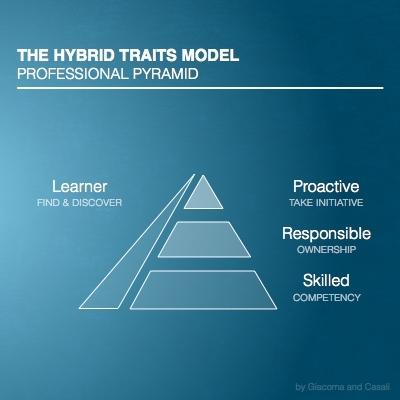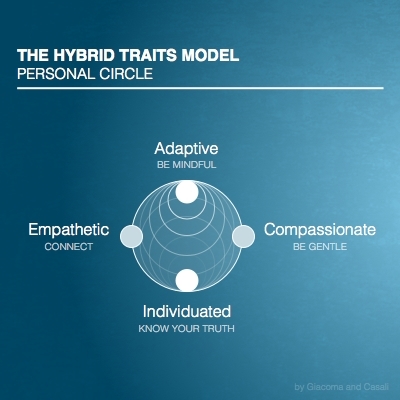Hack:
The Hybrid Traits Model for Management
This model presents a holistic approach to be a better person and professional, hire great people, create the best cultural fit and grow your skills. The model is split on two sides: the professional and the person, each with 4 key traits: skilled, responsible, proactive, learner and empathetic, compassionate, individuated, adaptive. The model will give you the foundation for a better business, team and collaboration awareness.
If we look around today we see even senior people, managers and CEOs that are deeply lacking in many if not all of the non-skill traits. We see “rude” people raising ranks. Or people with no leading abilities in lead positions. All around we see people that are disconnected from their human side because they've been told that "as professionals" their personal side should not be "on the job".
Nothing could be further than the truth, and this model gives the foundation for a better understanding of these dynamics, instead of hiding them under the carpet hoping that this wouldn't lead to a problem.
There’s a small insight at the beginning, so small it seems obvious. When we collaborate, work with colleagues, or with the client there are two parts playing a key role. One part is always taken as granted: we are using our skills as professionals. The other part should be obvious as well, but is strangely ruled out in a professional context as something that “shouldn’t be part of it”. And that’s the person. We are professionals, but we are also humans. This is an obvious but key understanding that still needs to happen on the workplace.
THE PROFESSIONAL PYRAMID

- Skilled, what defines us as professionals, everything that got taught in schools and universities, and what usually make up our job title. For most companies out there, this is the only thing that counts.
- Responsible, is the trait that tells how much a person is trustworthy and deliver a task if it gets assigned to them.
- Proactive, is the ability to find new things to reach an end goal. It's different from responsible because if nobody assigns a task, a proactive person will create a new one. These are the people that often take initiative on their own to make a better team and company.
- Learner, a person with this trait will keep moving forward, stays up to date and grows new skills.
THE PERSONAL CIRCLE
The personal circle is more difficult for two reasons. First because even if we worked to make it simple and usable by everyone, it still deals with the overwhelming complexity of human beings. Second because these traits are incredibly undervalued, to the point that sometimes we aren’t even aware of their existence. Thus the personal circle takes a little more to use and apply, but it’s also the part of the model that gives more insight in these elements that directly correlate to a great culture, great teamwork and overall an enjoyable way of working together.

The four traits are:
- Empathetic, is the trait that defines the ability to connect with others and be in their own shoes.
- Compassionate, is the other side of the coin from empathetic. In a sense, is the ability to work to solve the issues that you perceive with the first trait. You can think of empathy as a form of input and compassion as a form of output.
- Individuated, is the definition of one's self, their more important skill and core value. In a sense, this defines your true calling. In jungian terms, this when worked more in-depth leads to the individuation process.
- Adaptive, is the ability to move in a constantly changing world by being present. It's similar to the concept of being mindful by Jon Kabat-Zinn.
The model can be used for a wide array of activities:
- Be a better professional: these traits define abilities that are incredibly valuable but are very rarely assessed. Being aware of these and working to improve all 8 elements across the board will make you a better professional.
- Hire great people: even if we aren't aware of this, we are likely hiring people on the skill trait and using pure gut reaction for the other 7 elements. Good leaders and hr people already know that this isn't enough and they likely have a wider vision. This model brings some better foundation and a wider undersanding that can be easily used to assess people in the selection process. And if you want to be hired, it works well on the other way around.
- Create a great collaborative culture: teams are sometimes difficult to balance, because every person brings something to the table that has value. This model helps you to understand factors that play a huge role in dealing with collaboration and teamwork (empathy and compassion being the two most important ones).
- Be a better person: the model can also guide you for your own personal growth, because all the traits aren't specifically restricted to business and work contexts, but are universal. You can apply them to various parts of your life, because in the end they are about living and collaborating with people and get a better understanding of yourself.
The main challenges here are two:
- Inertia: people prefer working the way they always did, and they change only when a crisis of some kind happens.
- Awareness: people aren't often even aware of these extra traits. So it's difficult for them to understand them because they are completely new.
The model was developed in the last two years by Davide Casali and Gianandrea Giacoma.
A more in-depth explanation can be found here.
I have personally experienced people when promoted based on skill set only without judging them on personal cycle basis end up getting worst scores in employee surveys. The reason being they lack leadership skills, don't value other team member emotions and treat them more like a machine who should deliver at any cost.
- Log in to post comments
That's right! :)
Lack of empathy and compassion. :)
- Log in to post comments





You need to register in order to submit a comment.